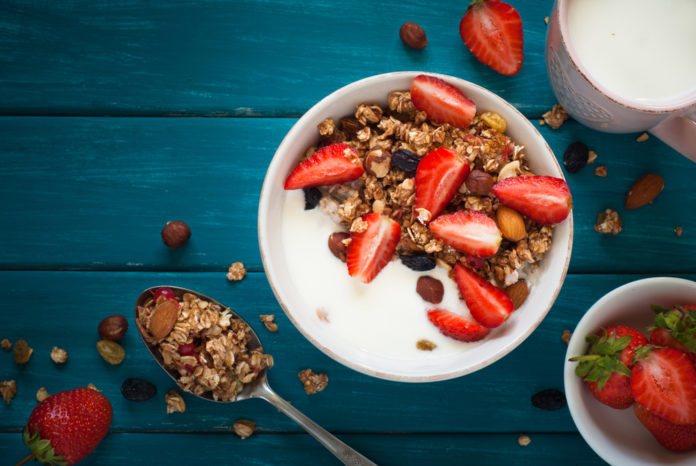Ready to revolutionize your eating habits without sacrificing the foods and flavors you love?
It’s true: You CAN eat healthier while still enjoying your life. And when you find that balance, you’re bound to unlock a version of yourself you didn’t even know existed.
Let’s waste no time! Here are 10 healthier eating habits that can transform your life.
10 Healthier Eating Habits
Ready to enhance your health and life? Start by exploring our first tip, eating the colors of the rainbow, and end on a hydrating note.
1. Eat Colors of the Rainbow
When it comes to consuming “rainbow foods,” the more, the better! Vibrant fruits and veggies supply ample nutrients, including fiber and powerful phytochemicals that protect the body against oxidative damage.
Throw spinach into smoothies, roast various squash assortments, snack on fresh blueberries, and experiment and try new foods.
2. Add, Do Not Subtract
Thinking about limiting and eliminating foods can cause negative thoughts and may hinder motivation for healthier eating. So rather than focusing on subtracting less-than-healthful foods, practice good eating by incorporating whole grains, fresh produce, lean meats, dairy products, and healthy fats.
Increasing such foods can naturally reduce room for other fillers that supply nothing more than calories, sugar, fat, and salt.
3. Stray Away from Calorie Counting
Although calorie counting is valuable for individuals to understand and track foods consumed, calories are just a small portion of the health equation. They may not totally be worth your efforts and stress.
Rather than fixating on calories, focus attention on whole foods. Healthier eating naturally eliminates the need to count calories while supplying the body with nutrients.
4. Have A Game Plan
Ordering off a menu or shopping at the grocery store can be dangerous territory, especially when hunger strikes and all foods look tempting. Having a game plan by formulating a grocery list or looking at the menu before dinner can reduce the risk of impulse buys and orders.
5. Eat Flavorful Foods
Individuals tend to perceive “diet” food as lacking flavor and dull, being less to be desired, and increasing the temptation of others. However, nutrient-rich foods can also be packed with flavor using oils, herbs, and spices.
6. Meal Prep
“Fail to plan and plan to fail” holds much truth regarding good eating practices. Meal prepping encourages individuals to organize weekly meals to reduce the temptations of after-work drive-thru runs. You can also lean on meal delivery services to take the guess and prep work out of the equation!
7. Snack
While snacking may be a habit you already implement, it may deserve some thoughtful modifications. Snacking can be a healthy eating habit, especially when consuming snacks ample in fiber and protein, as it may help lessen the risk of overeating at mealtime.
Healthy snacks include veggie slices and hummus, banana and peanut butter, and berries and Greek yogurt.
8. Implement Mindful Eating
Mindful eating is a rising approach to physical and mental health, as it helps nurture the body and strengthen relationships with food. The practice focuses on eating intuitively, monitoring hunger and satiety based on body cues, and appreciating the taste and smell of nourishing foods.
9. Eat Your Calories and Nutrients
Food should be the number one source of calories and nutrients. Drinks, especially sugary ones and alcohol, may not only pack on empty calories but do so quickly.
Nutrition experts encourage people to eat their calories rather than drink to help ensure nutrient content and naturally keep calories in check.
10. Drink Water
Drinking more water also follows the “add, not subtract” rule, especially when reducing soda intake. Keeping hydrated is imperative for the body to carry out numerous physiological processes, helps improve digestion, and may assist in weight loss and maintenance.
Generally, healthy adults should aim for at least eight 8-ounce glasses of water daily.






